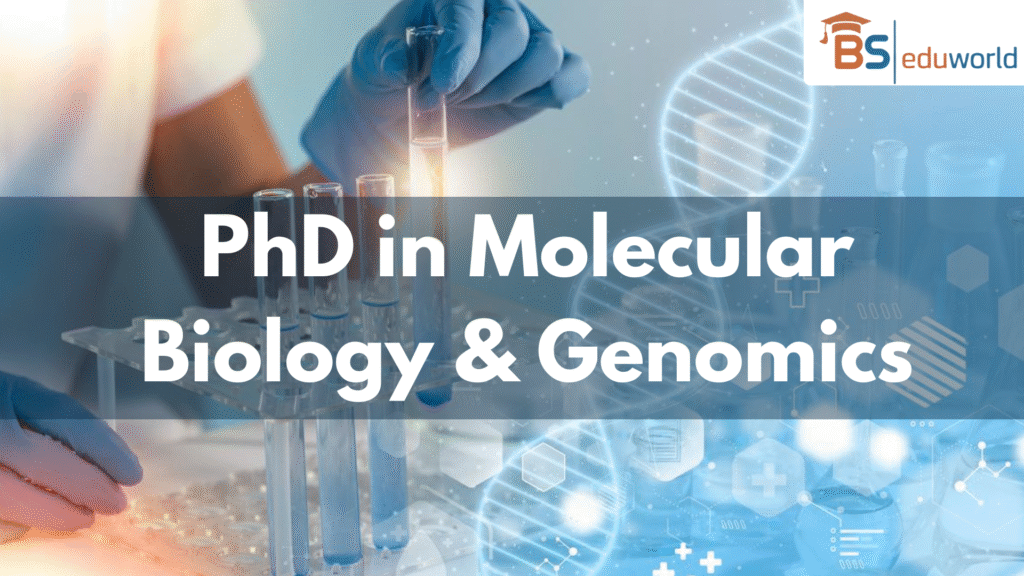We are living in the most exciting era in the history of biology. The ability to read, write, and edit the code of life our DNA is no longer a futuristic dream but a daily reality in labs around the world. From CRISPR gene editing to single-cell sequencing, the fields of Molecular Biology and Genomics are at the heart of a scientific revolution.

If you’re captivated by the fundamental mechanisms of life and driven to contribute to this revolution, you may be considering the pinnacle of academic training: a PhD. This path is a profound commitment, demanding years of dedication and resilience. But for the right individual, the rewards are nothing short of transformative. Here are the five powerful reasons to pursue a PhD in Molecular Biology & Genomics.
1. Become a Pioneer at the Frontier of Discovery
A PhD transforms you from a learner of known science into a creator of new knowledge. You are no longer just following protocols from a textbook; you are designing the experiments that will write the textbooks of tomorrow. Your research could involve developing a new genomic editing technique, uncovering the molecular basis of a rare disease, or tracing the evolutionary history of a pathogen. This role as a pioneer, asking questions that have never been asked and uncovering answers that change our understanding, is reserved for those with deep, doctoral-level expertise.
2. Master a Powerful Arsenal of Cutting-Edge Technologies
A PhD program is an immersive bootcamp in the most advanced tools in life sciences. You will achieve mastery in techniques that are reshaping science:
- Next-Generation Sequencing (NGS): Interpreting vast genomic datasets.
- CRISPR-Cas9 & Gene Editing: Precisely altering genetic information.
- Single-Cell ‘Omics: Analyzing the intricacies of individual cells.
- Advanced Microscopy: Visualizing biological processes in real-time.
This hands-on expertise with frontier technologies makes you an highly sought-after scientist in any field.
3. Unlock Leadership Roles in High-Impact Sectors
The credential of a PhD opens doors to elite career paths that are often closed to those with only undergraduate or Master’s degrees.
- Academia & Research Institutes: Lead your own research lab at a university or world-renowned institutes like the Broad Institute or the Sanger Institute, directing your own scientific vision.
- Biotech & Pharmaceutical R&D: Drive discovery and development of novel therapeutics, diagnostics, and gene therapies in companies like Genentech, Regeneron, or startups pushing the boundaries of medicine.
- Government & Policy: Shape the future as a science policy advisor, working at organizations like the NIH or WHO to guide ethical regulations and funding for genetic research.
4. Develop a Nobel-Caliber Problem-Solving Mindset
The core of a PhD is tackling a problem that has no known solution. This process forges an unparalleled intellectual resilience. You will learn to navigate the inevitable 99% of experiments that fail, troubleshoot complex systems, and persevere through years of uncertainty. This rigorous training in the scientific method—forming hypotheses, designing controlled experiments, and analyzing data—creates a analytical mindset that is invaluable in any high-stakes career, from venture capital to scientific journalism.
5. Earn the Authority to Drive Global Change
A PhD is the ultimate symbol of expertise. It grants you the credibility to influence the direction of scientific research, secure funding for your ideas, and lead interdisciplinary teams. More importantly, it gives you a platform to contribute to critical global conversations on ethics in gene editing, personalized medicine, climate-resistant crops, and pandemic preparedness. You transition from being a spectator to a leader who can directly impact human health and our planet’s future.
Is This Path For You?
A PhD demands intense curiosity, resilience in the face of failure, and a passion for discovery that burns brighter than the desire for a swift career path. But if you are driven by a deep need to understand the molecules that constitute life and to use that knowledge to solve some of humanity’s greatest challenges, there is no more direct or powerful path.
- Explore accredited PhD in Molecular Biology & Genomics
- Schedule a consultation with our experts.
Frequently Asked Questions (FAQs): A PhD in Molecular Biology & Genomics
1. What undergraduate degree do I need to apply?
Most successful applicants have a strong background in a core life science such as Molecular Biology, Biochemistry, Genetics, or Cell Biology. However, programs increasingly value interdisciplinary perspectives, so degrees in Chemistry, Physics, or even Computational Biology can be excellent preparation if supplemented with biology lab experience.
2. How is a PhD in this field funded?
Virtually all reputable PhD programs in Molecular Biology and Genomics in the U.S. and Europe provide full financial support for their students. This includes a full tuition waiver and a competitive stipend or salary to cover living expenses. Funding typically comes from:
- Research Assistantships (RAs): Funded by your principal investigator’s (PI) grants.
- Training Grants: Prestigious fellowships from institutions like the NIH.
- Teaching Assistantships (TAs): For teaching undergraduate lab courses.
3. What’s the difference between a PhD in Molecular Biology and a PhD in Genomics?
- Molecular Biology often focuses on the mechanisms: understanding how specific molecules (DNA, RNA, proteins) interact in a cell to carry out functions like replication, transcription, and translation.
- Genomics is a subset that focuses on the big picture: the structure, function, evolution, mapping, and editing of entire genomes. It’s more data-intensive and computational.
In practice, modern programs are highly integrated, and your research will likely blend both.
4. What are some of the most exciting research areas right now?
The field is rapidly evolving. Key areas include:
- Spatial Transcriptomics & Multi-Omics: Mapping the molecular landscape within tissues.
- CRISPR & Therapeutic Gene Editing: Developing cures for genetic diseases.
- Microbiome Research: Understanding how our personal ecosystems of bacteria impact health.
- AI & Machine Learning in Biology: Using algorithms to analyze complex biological data.
- Synthetic Biology: Designing and constructing new biological parts and systems.
5. How important is computational/bioinformatics skills for a modern molecular biologist?
Extremely important. Modern biology is driven by big data. While wet-lab skills remain crucial, the ability to analyze sequencing data, work with large datasets, and use basic programming (e.g., in R or Python) is no longer a niche skill—it is a fundamental requirement for being a competitive and effective researcher.
